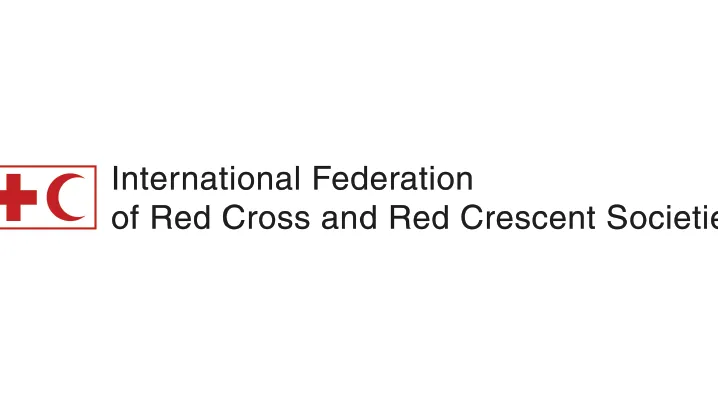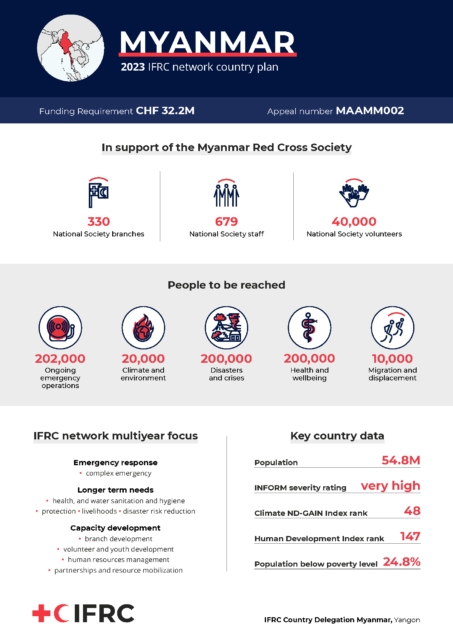Myanmar 2023 IFRC network country plan (MAAMM002)
29 November 2022

NATIONAL SOCIETY PROFILE
The Myanmar Red Cross Society is an independent, impartial and neutral humanitarian organization. It began its operations in 1920 as a branch of the Indian Red Cross. After Burma formally separated from India in 1937, the Society obtained official national status and was admitted to the IFRC in 1946. It is the oldest humanitarian organization in Myanmar. The National Society counts 692 staff and 40,000 volunteers. It operates through 330 township branches, 17 supervisory committees (states, regions and Naypyitaw Union Territory), and has branches in universities, colleges, and sub-branches at town, ward, village tract and schools across the country.
The role of the National Society – to serve independently and voluntarily while acting as the auxiliary of the state in the humanitarian field, in accordance with the Red Cross Red Crescent Fundamental Principles – is enshrined in the Myanmar Red Cross Society Law 2015.
The Myanmar Red Cross Society Strategic Plan (2021-2025) sets the following three goals:
- Build healthier and safer communities, reduce their vulnerabilities and strengthen their resilience
- Promote understanding and respect for the Red Cross Principles, Humanitarian Values, and International Humanitarian Law as a means to promoting social cohesion and non-violence
- Strengthen understanding of the Myanmar Red Cross’s auxiliary role among the humanitarian sector by developing a strong, well-functioning and resourceful National Society
According to its Strategic Plan, 2021–2025, with partner support, the Myanmar Red Cross aims to equip Red Cross volunteers, national headquarters and state, regional and township branches with the technical, financial and material resources “to be a well-functioning National Society with the capacity of providing humanitarian services to the most vulnerable people in Myanmar and beyond.”
The National Society plans to extend its traditional emergency response activities – including the delivery of ambulance and first aid services, primary health care, water, sanitation and hygiene services, psychosocial support and protection – while also developing its preparedness through disaster risk reduction, anticipatory action and resilience building.
To support these ambitions, the National Society plans to enhance its institutional capacity through branch development and decentralization, volunteer and youth management and capacity building, resource mobilization and human resource management, and partnership frameworks.
IFRC NETWORK ACTION IN 2023
Joint situational analysis
In 2023, the humanitarian situation in Myanmar will continue to be dominated by the ongoing complex emergency. This protracted crisis is the result of longstanding violence between state forces and ethnic armed organizations in border regions of the country; the situation deteriorated further following a military intervention on 1 February 2021. Moreover, the impacts of COVID-19 continue to slow socio-economic recovery in the country.
Since February 2021, there has been a marked increase in civil unrest and political instability in Myanmar. According to the International Committee of the Red Cross (ICRC), there are currently 12 ongoing non-international armed conflicts in the country.
As a result, insecurity is rising throughout the country, including in major urban centres including Yangon. Food insecurity, limited protection and the inability to access basic services – including mental health and psychosocial support, education and shelter – are expected to continue to be serious humanitarian concerns for 2023.
There are currently more than 1.2 million displaced people in Myanmar – the majority of whom were displaced following the military intervention in February 2021. There are also risks that significantly more people will be internally displaced in the near future, as authorities in Myanmar announced a plan to begin the repatriation of Muslims from Bangladesh. Following the outbreak of ethnic violence in Rakhine State in 2017, some 919,000 Muslims fled to Bangladesh.
Elevated and rising levels of displacement, due to increased levels of violence, present a major humanitarian challenge to displaced people and the communities that host them.
The politicization of humanitarian aid has led to operational challenges for humanitarian organizations including the Myanmar Red Cross and the IFRC network. Humanitarian organizations continue to experience restricted access to affected people, which has a significant impact on humanitarian logistics. Financial restrictions, including challenges in accessing currency, changing bank policies and authority-imposed bureaucratic bottlenecks, have negatively affected the scope of resources available for humanitarian programming and threatened the National Society’s financial sustainability.
Current financial policies have also led to widespread inflation, which continues to increase humanitarian needs across the country. The depreciation of the local currency and the increase in the official foreign exchange rate are likely to continue to affect the National Society’s capacity to plan and implement programmes, while also negatively affecting the ability of humanitarian organizations to deliver aid more broadly.
Accessing health care in Myanmar is difficult, as many health care workers have been participating in civil disobedience activities. Moreover, there is an ongoing lack of medicines and other essential supplies. For internally displaced people, the lack of access to health care is particularly grave as most are unable to access sexual and reproductive services and maternal and child health services. Many are also unable to seek treatment for communicable and non-communicable diseases and do not have access to safe drinking water or sanitation facilities. Additionally, most internally displaced people have unmet needs for mental health and psychosocial support.
While COVID-19 appears to be under control in the country, UNICEF reported that one million children have not been immunized against communicable diseases in Myanmar since 2021. Severe disruptions to the Expanded Programme on Immunization and the lack of access to water, sanitation and hygiene facilities are putting children and whole communities at severe risk of infectious and vaccine-preventable disease outbreaks. Internally displaced people are particularly at risk.
Access to safe drinking water and sanitation facilities remains inadequate in Myanmar. UN data indicates that 73.8 per cent of the urban population and 52.1 per cent of the rural population use safely managed drinking water. Moreover, according to UN data, only 53.4 per cent of the urban population and 64 per cent of the rural population have access to safely managed sanitation.
Myanmar is also a multi-hazard country and is prone to several hydrometeorological and geophysical hazards such as floods, landslides, cyclones, droughts and earthquakes.
Despite the challenging context, the Myanmar Red Cross will prioritize life-saving actions through a coherent and coordinated set of interventions in 2023 to respond to the increasing humanitarian needs across the country.
Announcements
21 May 2025
Open letter: Malaysia must lead ASEAN with principle, not hypocrisy, to address the Myanmar crisis

Progressive Voice is a participatory rights-based policy research and advocacy organization rooted in civil society, that maintains strong networks and relationships with grassroots organizations and community-based organizations throughout Myanmar. It acts as a bridge to the international community and international policymakers by amplifying voices from the ground, and advocating for a rights-based policy narrative.
